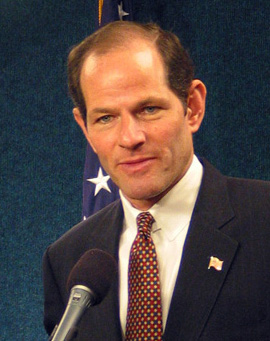On July 7th, 2013, just about 5 years after he resigned as Governor of New York due to his involvement in the most publicized prostitution scandal in recent history, Eliot Spitzer announced that he is running for New York City Comptroller and seeking forgiveness for his indiscretions.
In a July 8th interview on Hardball, Spitzer was asked if he thought that prostitution should be legalized.
I think the problem is that prostitution is, in fact, integrally related with other parts of criminal activity that is fundamentally wrong, dangerous, violative, on any dimension.
If people are saying, look, two people consensually having sex and there’s money, when you define it that benignly, it seems somewhat like smoking dope and people say, ‘aha, decriminalize it.’ But it is integrally related with other aspects of criminal behavior, so I’m not sure I’m ready to go there.
In a previous post about legal prostitution we suggested that there are at least two impediments that must be overcome before any worthwhile dialogue about decriminalizing and legislating sex work can begin. Spitzer’s recent comments and ongoing actions reflect why these barriers are so dangerous to sex work regulation.
1. Prostitution as an umbrella term
“Prostitution” is an umbrella term for all activity involving a sex-for-money transaction. From human trafficking and child exploitation to VIP escorts and legalized bordellos, any situation involving pay-for-play sex is, by definition, prostitution. In order to have a worthwhile discussion about whether or not legalizing prostitution is a productive alternative for American society, it must be understood that legal sex work does not condone, allow, or tolerate trafficking, coercion, or child prostitution in any way.
Legal sex work is a distinct category of Adult Entertainment, separate from the despicable classifications of prostitution mentioned above. Just as the legal pharmaceutical industry is not automatically grouped into conversations about illegal drug trafficking, the legal prostitution industry should not be included in conversations about sex trafficking or other “criminal activity.”
In true politician style, Spitzer holds fast to this short-sighted umbrella frame of thinking, readily grouping all manifestations of prostitution together and saying that activity related to prostitution is “fundamentally wrong.”
Read: Why assumptions about sex trafficking are harmful
2. Hypocrisy as a lifestyle
As attorney general of New York, Spitzer publically fought against sex trafficking and deeply understands the distinction between coercive, exploitative flesh trading and healthy sex transactions. Like other officials who criticize prostitution, Spitzer – even after all he has experienced – refuses to publically admit to the differentiation.
Spitzer actually engaged in safe, adult, consensual sex with numerous prostitutes on numerous occasions and yet he still refuses to entertain the possibility that prostitution of this nature should be legalized? Such brazen hypocrisy is marvelous to behold.
Spitzer knows that the majority of voters buy into the umbrella mode of thought when it comes to prostitution. It was, and continues to be, easier for him to publically denounce all forms of prostitution rather than initiate discourse about the realities of legislating and regulating sex work. But his private life reflects, or at least reflected, a different reality, a reality rife with whoring and balls-out naughty fun. Spitzer embraces hypocrisy as the easy alternative to challenging the status quo.
Should Eliot Spitzer be forgiven? Should he be given a second chance? If his hypocritical stance on legalizing prostitution is any indication, the Eliot Spitzer of 2013 looks a lot like the Eliot Spitzer of 2008…
Photo of Eliot Spitzer from Wikimedia Commons.



It is ironic given former Gov. Spitzer’s racy and perhaps controversial past that he is now boasting new found beliefs that prostitution is a crime and a direct link to violence and drugs. These statements are a direct attempt at earning back the trust and respect of the American public, in an effort to gain the popular vote. However, he may be a day late and a dollar short given his scandal with a prostitute. His past will always haunt him, no matter how many contradictory statements he makes. He is more well know for his relations with prostitutes then for his achievements while in office.
For those of us that are educated on legal prostitution, we know that legal prostitution is in a whole different class, then Spritzer’s negative umbrella of the sex industry as a whole. We are all very well educated, well versed upscale woman, much like the woman former Gov. Spritzer paid for sex. The only difference is that we are enduing in our “healthy sex transactions” in a controlled and legal environment. Deep down inside Elliott Spitzer is very much “pro” legal prostitution, but will deny it and lie to the American public for a vote.
Mr. Spitzer, why don’t you come play with us at Sheri’s Ranch @SherisBrothel we may change your mind!
If two consenting adults choose to partake in a legal transcation of money for sex, companionship, or generally an experience, I see nothing wrong with that, which is essentially what he did.. What former Gov. Spitzer is now trying to do is avoid his racy past, beg for forgivenenss all while generalizing legal, regulated activities with illegal ones. In that I see a major problem.. Every lady that works at a LEGAL, regulated brothel has many requirements to go through before she is even allowed to work. In no way is working at Sheris Ranch, or any other brothel, linked or “integrally related with other parts of criminal activity that is fundamentally wrong, dangerous, violative, on any dimension.”
Former Gov. Spitzer you might want to research (as I’m sure you did when you were using the services of a legal prostitute) the differences between what some women choose to do as a profession from a lawful stand point, as opposed to what you are disgustingly trying to generalize all sex work under..
Some politicians will do anything for a vote..
If two or more grown people want to have sex with each other and exchange money with service(s), then they should. It is their business and that of no one else.
The people who are against legal prostitution should pay more attention to women and other victims who are forced to have sex (for example, human trafficking).